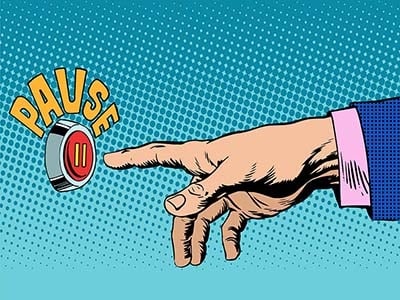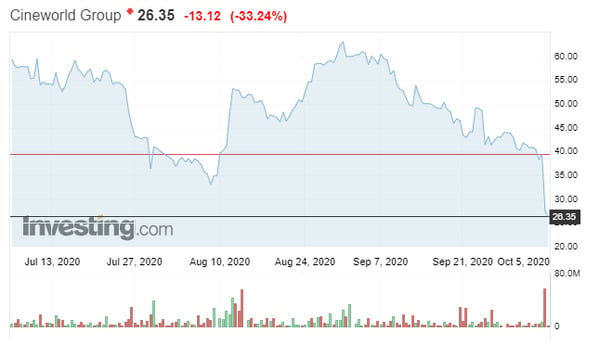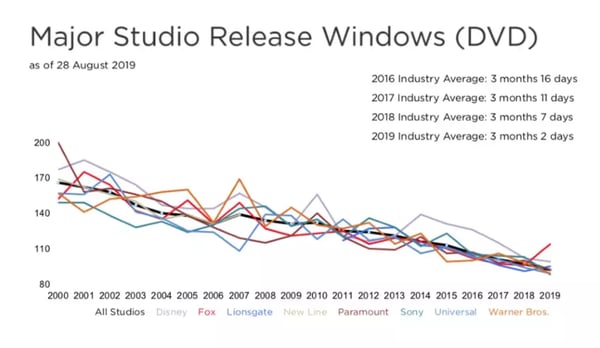Cineworld will operate major closing this week, putting on hold all of its movie theatres in the US and the UK, leaving over 45’000 workers unemployed.
Press pause
As you might have already seen, many movie companies such as Disney are pushing back the release of their movies, some of which more than a year after the initial launch date, as the last James Bond movie. Without new releases, cinemas no longer make sense, so the company decided to put everything on hold in hope for better days. "Without these new releases, Cineworld cannot provide customers in both the U.S. and the UK... with the breadth of strong commercial films necessary for them to consider coming back to theatres," said a Cineworld spokesperson.
It is 127 Cineworld and Picturehouse theatres in the UK and 536 Regal theatres in the US. Cinemas that will be closed starting October 8th, and no information was given about an eventual reopening date.

Impact on the shares
 Cineworld share price (Source: Investing.com)
Cineworld share price (Source: Investing.com)
If the stock was already not going so well after the pandemic, it took yet another hit after this news, going from $40 to $26 at the time of writing, all of this within 10 minutes after the opening bell. That’s a 60% price decrease to add to the 80% loss in experience this year. Seems like movie theaters survival are really on the line.
Covid and cinema
Quite evidently, the entertainment industry was one of the worst impacted from the pandemic, having to lay off thousand of workers. If we only look at Walt Disney, that’s already 28’000 people that suddenly found themselves without a job, although these were mostly from their theme parks. If streaming services were already hurting the cinema industry before the pandemic, COVID-19 might have been the final blow to your favorite cinema. "The spread of COVID-19 around the world has been a horror movie for the industry and the fresh wave of infections is the latest installment in what's been a devastating story for cinema chains,” said Hargreaves Lansdown analyst Susannah Streeter.
The movie industry is enormous, with a $136 billion worldwide estimated revenue last year only. Hollywood supports over 2 million jobs and 400’000 American business, while British film and TV are worth £60 million every day to the UK economy.

However, Corona was the brake to all this, halting movie productions and closing many cinemas. "Our problem right now is we have no movies, and this was a big blow for us,” said Tom Richards, Vue cinema’s boss, one of Cineworld’s rivals. "We are likely going to make it through. I'm concerned about the independents and the small regional operators right now that are going to really struggle, and when they close, they may not reopen."
A problem that was not new
However, this decrease in cinema attendance is not due to Covid-19 only. In all countries except China, the number of cinema ticket bought per year per capita has been continuously decreasing. This cannot be attributed to the experience, as seats are increasingly comfortable, sound and resolution always of higher quality.
What one must note is that there is an increasing demand for visual content. First, the theatrical window – or amount of time the movie is showed exclusively in theaters – has greatly decreased, translating the viewer’s impatience for novelty. Instead, they switch to streaming, which can offer them a great fluid of new shows to watch. In turns, this means that studio leave more time aside to produce content for their streaming services, meaning that there are fewer major movies seeing exposition on the big screens. “If content creators go direct to digital, they cut out the potential box office collections and satellite rights as a massive source of revenue generation for the producers. In addition, film stars were made for the big screen experience – it’s where they want their movies to be shown,” argues INOX Group's Jain.
 Shortened time of screening (Source: National Association of Theatre Operators)
Shortened time of screening (Source: National Association of Theatre Operators)
Future of the cinema industry
The whole business model of movies is changing, going from one-time sales to recurring revenues with on-demand subscriptions. There is no longer need to optimize production timing for holidays or fixed schedule releases. The only goal is user engagement and retention, through a careful data collecting process.
We must also not that this new model favors a direct distribution to consumers, burning the middle step that used to be theater owners. There has been many disputes and even boycotts of certain productions, when some chose to not stop by a projection room.
Others, though, adapt to the industry instead of whining, and try to transform the experience they offer. Many cinemas now offer a bar and restaurants, cozy places to stay and have a drink while you can talk and debate about the movie you just watched. Other cinemas consolidate, and try to do less but better, while profiting from economies of scale.
In the end, COVID-19 was maybe nothing but the finishing blow to an already fading – or transforming – industry. While I sure hope that cinemas will stay cultural centers where people can consume content and talk about it, it seems that the one who do not adapt to new expectations will disappear.

Sources:
https://www.investing.com/equities/cineworld-group-plc
Read our next article: Trump’s COVID relief rally - Market rundown





